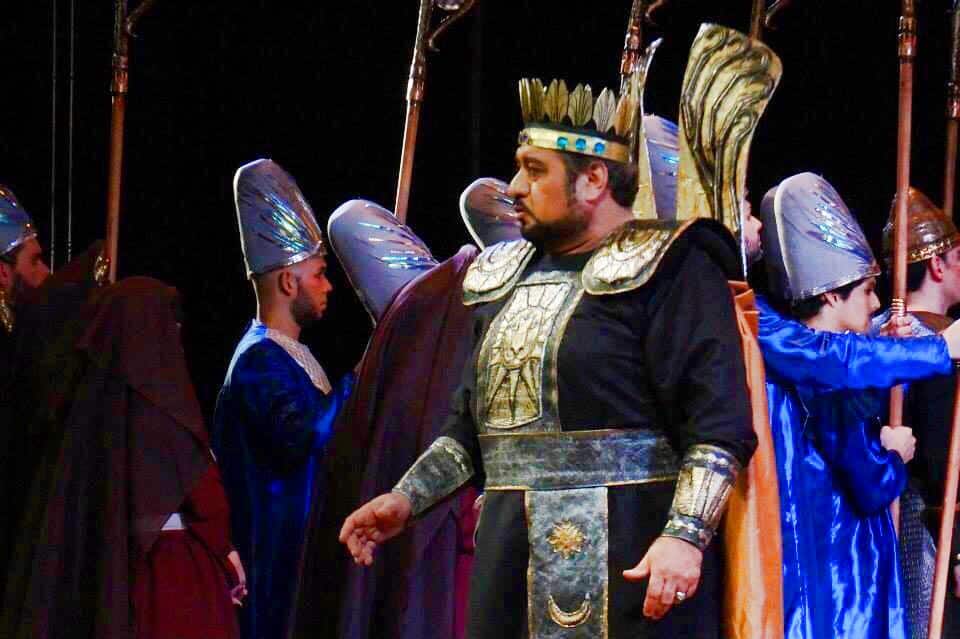“Nabucco” is an opera of biblical proportions: Scenes unfold in massive temples and legendary cities. Judean priests share the stage with armored Babylonian soldiers, flanked by crowds of citizens and slaves. A stone wall covered in Hebrew scripture looms above the throngs. When King Nebuchadnezzar proclaims himself a god, divine lightning strikes, and scores of actors fall to the ground, razed by the power of Yahweh.
If nothing else, the National Lyric Company is brave to produce Giuseppe Verdi’s “Nabucco,” which plays through the end of the week at the National Theater. In order to do this opera justice, you can’t do anything halfway. The costumes must be sumptuous, the scenery colossal. Most importantly, the singers must excel, especially the handful of leads. In the mid-19th century, Verdi was one of the most revered operatic composers to walk the earth, during a time in which opera itself was a cornerstone of European culture.
In short, the 140 artists involved in Lyric’s production of “Nabucco” form a tidal wave of talent and coordination, and the production is spectacular in every sense of the word. The singers and musicians perform all four unabridged acts, patiently telling their Old Testament story over the course of three-plus hours. The National Theater is the perfect venue for such a show, because it’s neither too big nor too small. Performing on a newly renovated stage, the “Nabucco” cast requires no amplification, and every seat in the house feels intimately close to the action.
A contemporary listener may be taken back at first by the contrast between Verdi’s music and the opera’s setting. After so many epic movies, we millennials associate certain instrumentals with the ancient world. We see stone palaces and expect “orientalist” music, like Tchaikovsky’s “Arabian Dance” or Hans Zimmer’s “Gladiator” soundtrack. We expect something mysterious and ethereal, because that’s how Hollywood always musicalizes the Middle East, whether it’s modern Lebanon or ancient Troy.
Verdi’s score is nothing like that, and if you’re not familiar with Verdi and the Italian tradition, the arias may seem misplaced. Much of the overture has the bombast of a marching band, while other parts are sweet and sublime, heavy on the woodwinds. Opera fans already familiar with Verdi will relish the music, because it is among the most revered in the Western canon. But if you know little about opera, you may need an act or two to acclimate. With lyrics like “they shall drown in oceans of blood and tears,” the music can seem a little, oh, upbeat.
But “Nabucco” is a major event, a holistic experience, and you would be wise to sit back and let it wash over you. Conductor Elio Orciuolo is a directorial force, and he guides the National Symphony Orchestra with nearly acrobatic expression. Sure, you can see the orchestra almost any week of the year, but it is a singular pleasure to watch Costa Rica’s finest musicians play alongside the National Symphony Choir, all the while relating a 2,500-year-old story on the nation’s most eminent stage.
A crash course on the Book of Daniel: “Nabucco” is the story of Nebuchadnezzar II, the Babylonian king and Bronze Age blowhard, who conquered Jerusalem, destroyed the Jewish temple, renounced the Hebrew God, and was punished with seven years of insanity, after which he embraced monotheism and redeemed himself. Nabucco also has two daughters, Abigaille and Fenena, who are stuck in a love triangle with Ismaele, a Jewish prince. There are lots of subplots, but the general gist is that Abigaille is a gold-digging villainess, and Nabucco is transformed from an arrogant tyrant to a humbled servant of the Lord.
As Nabucco, Carlos Almaguer is a robust baritone and appropriately regal presence. He is physically dense and boasts a powerful visage; if Lyric ever stages an opera about Genghis Khan, Almaguer will be their clear choice for the lead. Like most classical opera, the arias are mostly declarative monologues (“You are so beautiful,” “You can still save your people from death,” etc.). The genre isn’t known for its subtlety, and Almaguer spends much of his stage time being angry and autocratic. But halfway through the story, Nabucco finds himself half-mad and imprisoned by his own daughter, and Almaguer has the chance to sing with tender remorse. The massive cast is stripped away, and Almaguer is alone, expressing his sorrow in a simple spotlight.
At the same time, Nabucco is really not the star of “Nabucco,” and he never has been. His character has plenty to do, but it is Abigaille who summarily upstages him. Abigaille is a big personality, lusty and vengeful, and her arias are a soprano’s dream. On the night I saw “Nabucco,” it was Elizabeth Blancke-Biggs who played Agibaille (Giselle Santamaría takes the role Aug. 8), and she stole the entire show. Watching a ruthless antiheroine is always fun, but to hear Blancke-Biggs belt her way through such complex scales is a rare enchantment.
Whether you love opera or not, “Nabucco” is worth an extravagant evening in San José. Like the Aramaic text that inspired it, the production is designed to astonish you. Let it.
“Nabucco” continues through Aug. 10 at the National Theater, downtown San José. Thu. & Fri., 7:30 p.m.; Sun., 5 p.m. ₡2,000-30,000 ($4-60). Info: National Theater website. (Performed in Italian with Spanish supertitles.)






